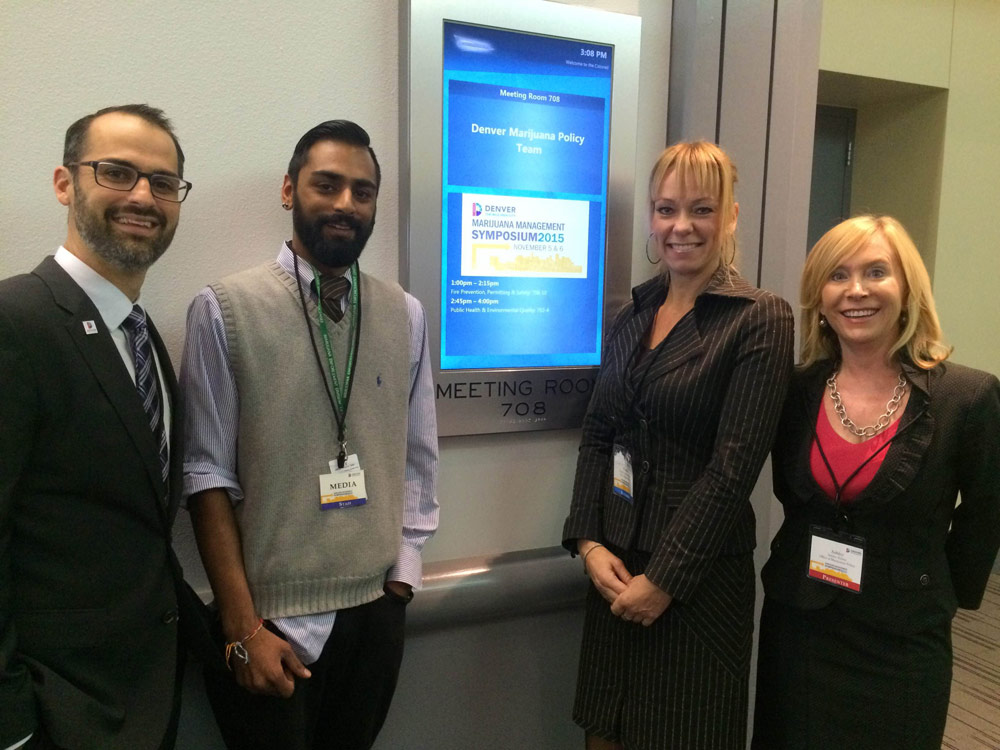The number of conferences in the cannabis industry is almost on par with the ever-expanding music festival scene. With new conferences seemingly appearing on a weekly basis, deciding on the events worth the investment (money, time, bandwidth) can be difficult.
However, when a friend who works for the city and county of Denver’s Office of Marijuana Policy told me about a two-day symposium the city was holding for 420-situated regulators, I knew I had to attend.
Denver’s inaugural Marijuana Management Symposium, which wraps up with a full day of programming on Friday, was a chance for Denver to share its approach to cannabis regulation — and for the city to also learn from policy makers from around the country, continuing the collaborative process that has led us to where we are today.
Interestingly, the event was hosted by the city’s regulators — as opposed to the state’s Marijuana Enforcement Division, which operates within the Department of Revenue.
I got to the Colorado Convention Center around 8:30 a.m. Thursday, picked up my media pass and got a quick rundown of the event from Dan Rowland, the city’s marijuana communications adviser.
I headed into the main presentation room, coffee in hand and eager to hear from “the other team.” Did I mention I also work in the industry? Because I do, and as industry members, we sometimes perceive our regulators as if they are our parents during the teen-angst years — their rules seem unnecessarily strict because they’re out to get us!
Of course, this could not be further from the truth. With regulators attending the symposium from throughout Colorado, other states and even Amsterdam, the event’s goal was to share insight from the implementation of our unique social experiment. It was a chance to show regulators from around the world that a robust system of cannabis regulation and taxation was the product of collaboration among industry representatives, regulators, lawmakers and community stakeholders.
Unlike many jurisdictions, Denver has a dedicated regulatory body for marijuana.
After Mayor Michael Hancock’s pre-recorded introduction and a keynote emphasizing the importance of city government, the first panel was underway. Led by Denver’s marijuana czar Ashley Kilroy, it was a brief history lesson on marijuana law in Colorado, followed by a case study on how many state and local agencies worked collaboratively to learn about and work through the ongoing enforcement of pesticide use in marijuana cultivation facilities. From an industry point of view, the case study demonstrated a concern for public safety and health above anything else.
I stepped outside for a smoke, a cigarette, where I noticed attendees of the weed industry stalwart Champs Trade Show nearby smoking joints and bowls out on the sidewalk. Many of them were from out of state and were likely unfamiliar with our public consumption laws. Nonetheless I couldn’t help but appreciate the fact that they were blissfully unaware that representatives from many state and local regulatory bodies were comfortably seated in a room just a few hundred yards away.

I walked back inside and was introduced to Yvette van Groenigen, the marijuana policy adviser to Amsterdam’s mayor. Despite the common misconception that cannabis is legal in the Netherlands, small marijuana sales (5 grams or less) are tolerated in Amsterdam, but cultivation and transport are not legal. So she had arrived in Denver (for the first time) an eager student, ready to learn and absorb information to share with her city council back in Amsterdam.
Overall, she said she was “very impressed” with the professionalism exhibited by the operators and employees of the facilities she visited. She was also pleasantly surprised that industry workers were also passionate advocates, contrary to the operators in the Netherlands who oppose legalization based on a potential threat to commercial profit.
The first day of the marijuana symposium wrapped up with a couple of panels and a cocktail reception. I walked around with my Coors Banquet, catching up with industry friends from NORML, Good Chemistry, the National Cannabis Industry Association, FlowHub and elsewhere. I also ran into David Mendoza, the marijuana policy adviser to the Mayor of Seattle. We reminisced about a technology panel we sat on together in Seattle last year and discussed the implementation of regulations around Washington’s medical marijuana industry.
Today marks three years since Colorado voters historically — and decidedly — approved Amendment 64, legalizing recreational cannabis. We have the most well-regulated system in the world, but as I discovered at the symposium, our regulators are also still learning as they go.
The city’s Rowland said it best: “The story, as we know it, is still being written.”
Originally written for and published by The Cannabist, a division of The Denver Post, on November 6, 2015


